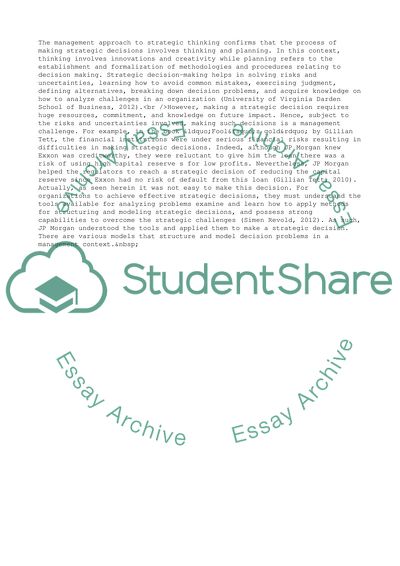Cite this document
(Relation to Fool's Gold by Gillian Tett Essay Example | Topics and Well Written Essays - 2000 words, n.d.)
Relation to Fool's Gold by Gillian Tett Essay Example | Topics and Well Written Essays - 2000 words. https://studentshare.org/management/1782074-rationality-and-power-often-go-hand-in-hand-to-think-of-organizations-and-their-surrounding-environment-as-being-political-systems-changes-they-way-in-which-we-think-about-strategic-decision-making-critically-discuss-this-statement-in-relation-to
Relation to Fool's Gold by Gillian Tett Essay Example | Topics and Well Written Essays - 2000 words. https://studentshare.org/management/1782074-rationality-and-power-often-go-hand-in-hand-to-think-of-organizations-and-their-surrounding-environment-as-being-political-systems-changes-they-way-in-which-we-think-about-strategic-decision-making-critically-discuss-this-statement-in-relation-to
(Relation to Fool'S Gold by Gillian Tett Essay Example | Topics and Well Written Essays - 2000 Words)
Relation to Fool'S Gold by Gillian Tett Essay Example | Topics and Well Written Essays - 2000 Words. https://studentshare.org/management/1782074-rationality-and-power-often-go-hand-in-hand-to-think-of-organizations-and-their-surrounding-environment-as-being-political-systems-changes-they-way-in-which-we-think-about-strategic-decision-making-critically-discuss-this-statement-in-relation-to.
Relation to Fool'S Gold by Gillian Tett Essay Example | Topics and Well Written Essays - 2000 Words. https://studentshare.org/management/1782074-rationality-and-power-often-go-hand-in-hand-to-think-of-organizations-and-their-surrounding-environment-as-being-political-systems-changes-they-way-in-which-we-think-about-strategic-decision-making-critically-discuss-this-statement-in-relation-to.
“Relation to Fool'S Gold by Gillian Tett Essay Example | Topics and Well Written Essays - 2000 Words”. https://studentshare.org/management/1782074-rationality-and-power-often-go-hand-in-hand-to-think-of-organizations-and-their-surrounding-environment-as-being-political-systems-changes-they-way-in-which-we-think-about-strategic-decision-making-critically-discuss-this-statement-in-relation-to.


